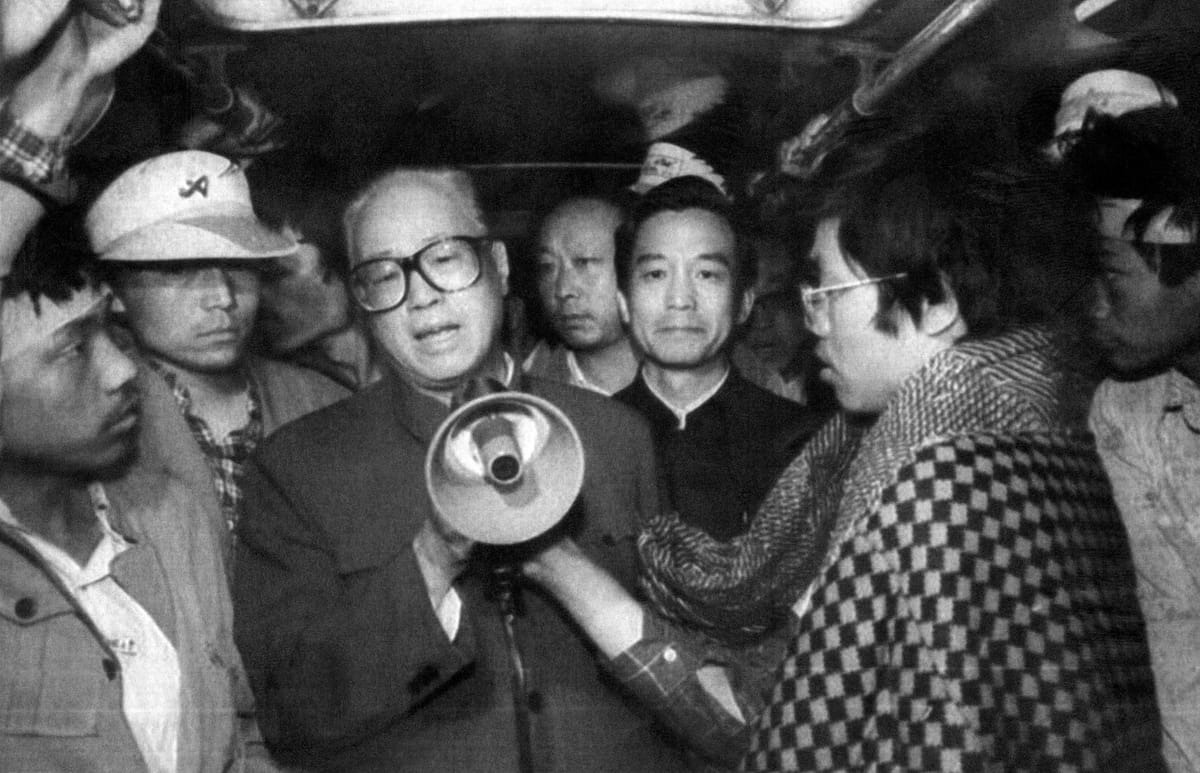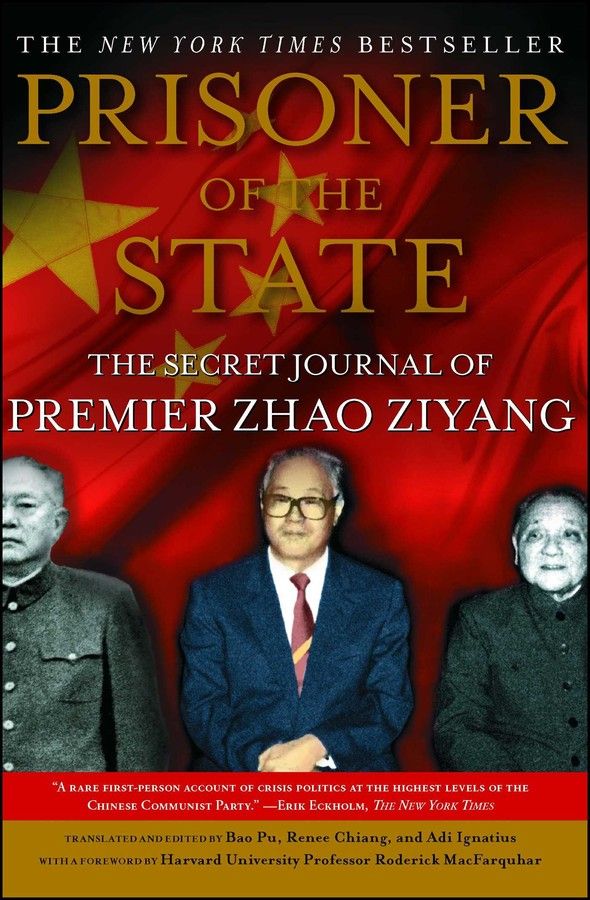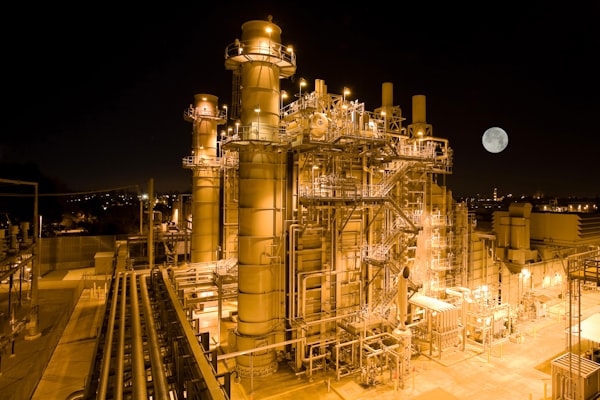Prisoner of the State: The Tragedy of Zhao Ziyang


There are many lessons we can learn from Prisoner of the State, Zhao Ziyang’s memoirs of the economic reforms which he recorded in secret while under house arrest. One of them is the Kafkaesque experience with his captors, who refused to acknowledge that Zhao was under house arrest while forbidding him to leave without first obtaining permission (and even then, he would be accompanied by minders and forbidden from interacting with the public – one particularly amusing account is when Zhao was permitted to golf but the police / intelligence agencies ordered an evacuation of the golf course prior to his arrival). Under totalitarian socialist systems, no challenges to the official Party line can be tolerated, and Zhao represents a fundamental threat to the survival of one-party rule in China for daring to sympathize with the protestors at Tiananmen and refusing to mobilize the military against the unarmed student demonstrators.
Another noteworthy takeaway is that the common understanding of China’s reforms (at least as understood by many western commentators) is incorrect. The usual story goes that after the Mao era, Deng and his supporters abandoned communist ideology, and instead were motivated by the pursuit of economic growth. So the story goes, today the modern CCP merely invokes Marxist rhetoric as a means of legitimizing its actions among the public, and that it has abandoned any true ideological commitment and adherence to Marxism-Leninism-Maoism. But this could not be further from the truth. Even leading economic reformers such as Deng Xiaoping, the man often credited with spearheading China’s reforms after Mao’s death, professed their commitment to the superiority of one-party rule and communist ideology. Deng overruled Zhao’s modest proposals at political reform to allow for the creation of an independent judiciary and civil service, and ultimately Deng was responsible for mobilizing the police and military to shoot unarmed protestors in 1989.
Moreover, the leadership of China was not unified in its support for economic reforms during the 1980s, nor were these reforms adopted in a linear, consistent manner. There were many periods of backtracking, such as the 1983 “anti-spiritual pollution” campaign, and the 1987 “anti-bourgeois liberalization” campaign, both supported by Deng and both opportunities for CCP conservatives to resist and roll back economic liberalization during these periods. Moreover, since the party conservatives lacked the political clout to challenge Deng himself, they attacked his reformist subordinates such as Hu Yaobang and then Zhao Ziyang. Even Zhao himself publicly supported these campaigns, though he made efforts to moderate and set limits on the 1987 “anti-bourgeois liberalization” campaign in which he was supported by Deng.
The 1987 campaign occurred in the wake of Hu Yaobang’s dismissal as General Secretary of the CCP, in which conservatives believed that Hu was too lax in suppressing speech of dissidents. Deng agreed, and Hu was forced to publicly engage in “self-criticism,” a self-denunciation for his supposed failings before senior Party officials. This practice was a relic of the Mao era, showing that the inner workings of the Party did not change as radically during the 1980s as the traditional western narrative about the Deng era would lead us to believe. It's also interesting to note that it was the death of Hu Yaobang on April 15, 1989 that sparked the initial student demonstrations in Tiananmen, as students gathered to mourn the loss of one of China's most prominent reformers.
The most tragic lesson at all, perhaps, is that Prisoner of the State (Zhao’s personal memoirs with some annotations by the editor and translator to provide context for western readers) is not one of policy or “what ifs” pertaining to China and the 1.5 billion Chinese people. Instead, it offers a cautionary tale for those would-be reformers – either within a party-state such as the modern CCP or those who seek to transform western democracies in a top-down manner – it does not matter who is at the helm of the state. Ideology is ultimately what matters. The prevailing culture is what matters. If the society goes along with and submits to domination by totalitarian thugs (such as the Chinese people did after Tiananmen), the movement for freedom and individualism will die.
Zhao was not an ideologue. He was a technocrat who believed that economic reform would be an important component to improving the Chinese economy and the livelihoods of ordinary Chinese people. He rejected dogmatic (i.e., principled) communism / socialism in favor of pragmatic policy initiatives. He viewed political reform as a means of achieving economic reform, as the domination of the CCP by Party elders such as Li Xianian caused stagnation in the realm of economic reforms. He was open to suggestions and influenced by western market economists such as Milton Friedman, even meeting with Friedman on at least one occasion. He believed in tweaks to the structure of the Chinese government that would keep the CCP in a position of domination over the government, while tinkering at the edges to allow members of the other 7 legal political parties to enter into positions such as Vice Minister and Ministerial posts. He even wished to see a separation between party and state, such as the creation of an independent judiciary and a professional independent civil service. Yet even these changes represented a view / position too radical for even economic reformers such as Deng Xiaoping.
But in his exile/house arrest following the 1989 Tiananmen crackdown, Zhao became convinced that western style “parliamentary democracy” was the best form of government yet devised, and the most conducive to a modern market economy. It was only after Tiananmen that he realized that the Party could not be changed from within. One of the most disappointing facts about Tiananmen was the United States' pathetic, appeasing response. The protestors were motivated and inspired by their (mistaken) belief that they had at least the moral support of the American government and the American people. But those hopes were dashed when President Bush immediately reached out to reassure the tyrants in Beijing that the US was eager to resume the diplomatic relationship, as if nothing had ever happened. Despite a limited array of sanctions (mainly in the form of suspending US weapons exports to China), Washington remained quiet, and top diplomats quickly flew to Beijing to make to try to restore the relationship.
The road ahead is a rough one for free-thinkers and individualism in the west, even in the United States. Even in the age-old bastion of those values, those values are under attack every day. They are under attack in universities and in Hollywood. They’re under attack at the local church and in the media. We can’t stand idly by, silently suffering indignantly as a professor rants about the evils of capitalism or the necessity of religion. If we wish to fight for freedom and individualism, the time is now. The United States, for better or for worse, remains a beacon of hope and an inspiration to freedom fighters the world over. They look to the United States as the model to emulate, and despite our own failure to practice those values consistently in recent years, we remain the fountainhead of liberty and individualism. What we do here will have ripple effects the world over.
We have access to what Chinese dissidents of the 1980s (and today) could only dream of: we have at our fingertips, in our pockets, the means to change the world. And in the spirit of the man who invented the iPhone, we must speak boldly so that we may change the world.
You can obtain a copy of Prisoner of the State here.




